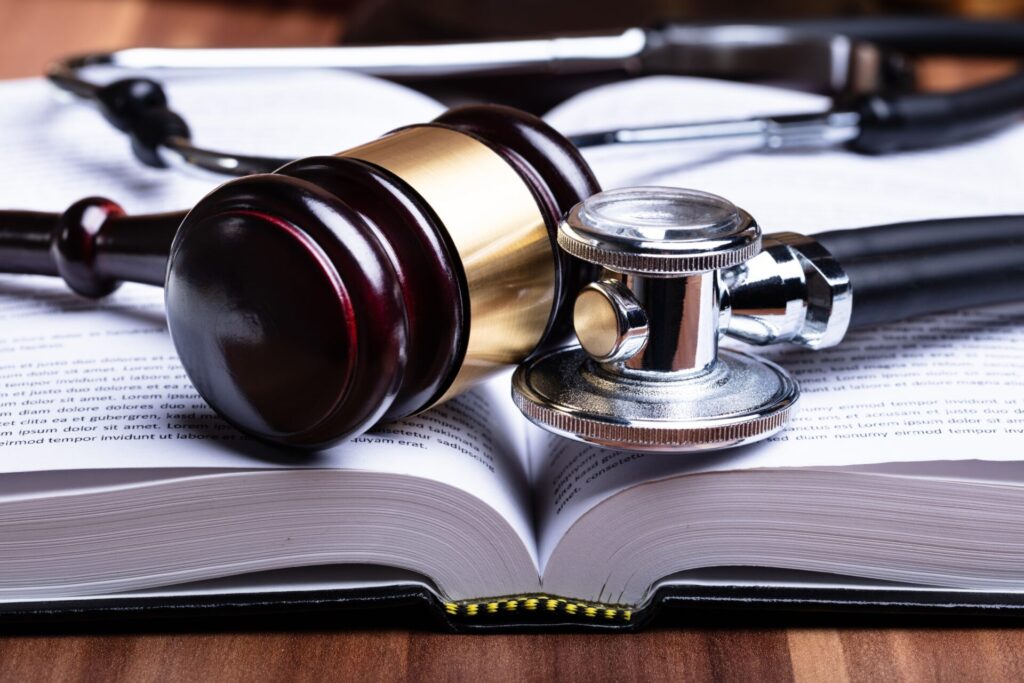Patients and families may seek legal recourse when harmed due to a nurse’s failure to meet professional standards. Nurses must adhere to established standards of care to avoid legal liabilities. Understanding one’s rights can empower patients to take action against nursing malpractice.
Nursing malpractice cases can be complex and emotionally draining. However, knowing that you have the right to seek compensation if a nurse fails to meet the expected standards of care can provide some relief.
This blog aims to equip you with the knowledge to identify nursing malpractice, understand the legal process, and make informed decisions about pursuing a claim. We’ll explore the details to empower you in protecting your rights and those of your loved ones.
If you or a loved one has suffered due to nursing malpractice, you have the right to seek justice and compensation. At The Pagan Law Firm, P.C., we understand the emotional and financial toll this can take on your life. Our experienced New York medical malpractice lawyers are committed to holding negligent nurses accountable and fighting for the compensation you deserve. Don’t let medical providers get away with substandard care. Contact us today at 212-967-8202 for a free consultation, and let us help you navigate the complexities of your case. Your path to recovery and justice starts here.
👉Also Read: Understanding Which Condition May Increase the Potential for Nursing Malpractice: Risks and Prevention
Understanding Nursing Malpractice

Nursing malpractice is defined as the failure to provide services that meet minimum care standards, resulting in harm to the patient. Establishing a nursing malpractice claim requires proving that the nurse’s actions deviated from the accepted standard of care, causing harm. Such deviations from standard care set the stage for medical malpractice lawsuits.
Nurses can unintentionally injure patients through negligence, such as failing to monitor vital signs or mishandling medical equipment. Conditions leading to nursing malpractice often stem from staff shortages, overwork, and inadequate care protocols. These factors can create an environment where nursing mistakes are more likely to occur, jeopardizing patient safety.
In a nursing malpractice lawsuit, the nurse, attending doctor, and potentially the medical facility can all be sued for damages. This multi-faceted approach ensures that all responsible parties are held accountable. In New York, malpractice claims can be filed against various licensed healthcare providers, including nurses. Grasping these dynamics is crucial for anyone contemplating a medical malpractice claim.
Common Nursing Mistakes and Their Consequences
Medication Errors: Nurses may commit medication errors by administering the wrong medication, giving medication to the wrong patient, or providing an incorrect dosage. These mistakes can have severe consequences for patient health.
Improper Documentation: Accurate documentation is essential for effective patient care. Nurses must chart all aspects of patient care, including any refusals of treatment or medication, and notify relevant medical personnel. Altering or failing to document patient records can lead to legal repercussions and jeopardize patient safety.
Inadequate Wound Care: Negligent wound care can result in serious infections or complications. Comprehensive charting of the entire nursing process is necessary to ensure that all critical details are recorded and that the patient receives appropriate care.
Inadequate Monitoring: Errors can also occur from insufficient monitoring of patients, potentially leading to severe health complications. Proper and timely documentation of patient observations is crucial to prevent adverse outcomes.
👉Also Read: Who Can I Sue for Nursing Malpractice?
Determining Liability in Nursing Malpractice
Determining liability in nursing malpractice cases can be a complex issue. Legal professionals clarify the standard of care in medical malpractice cases, essential for proving negligence. Assigning liability can be particularly challenging when multiple parties are involved, such as nurses, doctors, and hospitals.
The following subsections explore the specific responsibilities of nurses, hospitals, and doctors, clarifying how liability is determined.
Nurse’s Responsibility
Adhering to the established standard of care is critical for nurses, as failure can result in liability. A nurse can be held accountable if their actions are determined to have deviated from what is deemed acceptable in similar circumstances. Nurses are legally obligated to monitor their patients and report any complications to the medical team.
Failing to communicate a patient’s changing condition can jeopardize treatment. Nurses must ensure medical equipment is functioning properly to prevent endangering patient lives. Monitoring health indicators like vital signs and fluid input/output is a critical part of a nurse’s responsibilities.
Thorough and timely documentation by nurses can significantly aid in defending against malpractice claims. Documenting procedures, findings, and medications is a key responsibility of nurses. Failing to make necessary entries in the patient’s chart is considered nursing negligence in terms of documentation.
Hospital’s Role
Hospitals may be liable for nursing malpractice due to inadequate staff and insufficient care. Hiring, training, and monitoring nursing staff are factors contributing to hospital liability in malpractice cases. Research indicates that staffing shortages often lead to nursing malpractice incidents.
Hospitals are responsible if a nurse was acting within their employment duties during a negligent incident. A malpractice claim can be brought against a hospital when an incident is caused by an employee. However, in cases where hospitals provide adequate training and supervision, they may avoid liability for nursing malpractice.
Doctor’s Oversight
Doctors may share liability if they were present and failed to address a nurse’s negligent actions. The collaboration between medical professionals, including doctors and nurses, is crucial in providing comprehensive patient care. When this collaboration fails, it can lead to severe consequences for the patient.
Medical malpractice lawsuits often involve multiple parties, with doctors’ oversight being a significant aspect. Knowing the role of doctors in nursing malpractice cases helps determine the full scope of liability and ensures all responsible parties are held accountable.
👉Also Read: Is nursing staff exhaustion getting worse?
Steps to Take If You Suspect Nursing Malpractice
If nursing malpractice is suspected, consult a new healthcare provider to prioritize your health and document your concerns. Avoid direct accusations toward your current doctor to prevent defensive reactions that hinder access to necessary medical records.
Gather all relevant medical documentation, including doctor’s notes and lab reports, to support your malpractice claim. Keep detailed notes about your symptoms and treatments to substantiate your malpractice claims. The Pagan Law Firm emphasizes the importance of thorough investigations in nursing malpractice cases to gather evidence and support claims.
Contact an attorney experienced in nursing malpractice to establish liability and prove negligence linked to injuries. Experienced attorneys can better navigate the complexities and circumstances unique to nursing malpractice cases. Seek treatment from another healthcare provider if you suspect malpractice, and document your symptoms and injuries.
Filing a Nursing Malpractice Lawsuit
Filing a nursing malpractice lawsuit involves several critical steps:
Consult an Attorney: The first step is to consult with an experienced medical malpractice lawyer who can evaluate your case. They will review your medical records, consult with experts, and determine if you have a valid claim.
Investigation: Your attorney will conduct a thorough investigation to gather evidence. This may include obtaining medical records, interviewing witnesses, and consulting medical experts to establish that the nurse’s actions deviated from the standard of care.
Filing the Complaint: If the New York medical malpractice lawyer believes you have a case, they will file a formal complaint in court. This document outlines the details of the alleged malpractice, the harm caused, and the compensation you seek.
Discovery Process: Both sides will exchange information during the discovery phase. This includes depositions, interrogatories, and requests for documents. Expert witnesses may be called to provide testimony on the standard of care and how it was breached.
Settlement Negotiations: Often, nursing malpractice cases are settled out of court. Your attorney will negotiate with the defendant’s legal team to reach a fair settlement. If a settlement cannot be reached, the case may proceed to trial.
Trial: If your case goes to trial, your attorney will present the evidence to a judge or jury. They will argue your case, cross-examine witnesses, and work to prove that the nurse’s negligence caused your injury.
Verdict and Compensation: If you win the case, the court will award you compensation for damages, which may include medical expenses, lost wages, pain and suffering, and other related costs.
Filing a nursing malpractice lawsuit is a complex and time-sensitive process. It’s essential to work with a knowledgeable attorney who can guide you through each step and help you seek the justice and compensation you deserve.
Damages You Can Recover in Nursing Malpractice Cases
New York law allows patients to seek damages for negligence by nurses, covering pain, lost income, and medical costs. Victims of nursing malpractice can claim compensation for both financial losses and emotional distress in a New York medical malpractice case. Compensation may cover lost income due to time away from work and future earning capacity.
It can also cover unexpected medical bills, care, and equipment needed due to injury. Lost wages and medical expenses are common types of economic damages in malpractice cases. New York imposes no statutory limits on the amount of compensation a victim can seek in malpractice cases.
New York has no caps on actual financial losses, including medical expenses and lost wages. Future medical expenses can be recovered in a nursing malpractice case. Knowing the types of damages you can recover helps evaluate the full impact of nursing malpractice on your life.
Statute of Limitations for Nursing Malpractice Claims
The statute of limitations for medical malpractice claims varies by state, but in New York, you typically have 2.5 years from the date of the malpractice incident to file a lawsuit. However, there are some exceptions to this rule. For example, if the malpractice involves continuous treatment, the statute of limitations may begin from the last date of treatment. Additionally, if the victim is a minor, the statute may be extended until a certain time after the child turns 18.
It’s crucial to act quickly if you suspect nursing malpractice, as missing the statute of limitations can prevent you from pursuing a claim. Consulting with an experienced attorney can help you understand the specific time limits and ensure that your case is filed in a timely manner.
How an Experienced Medical Malpractice Attorney Can Help

An experienced medical malpractice attorney is essential in navigating the complexities of your case and ensuring you have the best chance of success. They will evaluate your claim, gather crucial evidence, and leverage their network of medical experts to prove negligence. By handling all legal procedures and deadlines, they prevent errors that could jeopardize your case.
In addition to providing strong representation in court, an experienced attorney will use their negotiation skills to secure a fair settlement, often without the need for a trial.
👉Also Read: 4 Elements of Nursing Malpractice
The Pagan Law Firm: Your Partner in Nursing Malpractice Cases
The Pagan Law Firm is your trusted partner in nursing malpractice cases, dedicated to securing justice for victims of negligent care in New York and New Jersey. We are dedicated to representing clients in nursing malpractice cases, working tirelessly to hold negligent parties accountable and pursuing the compensation you deserve. With our commitment to operating on a contingency fee basis, you won’t pay unless we win your case. Contact The Pagan Law Firm today for a free consultation and take the first step toward protecting your rights.

